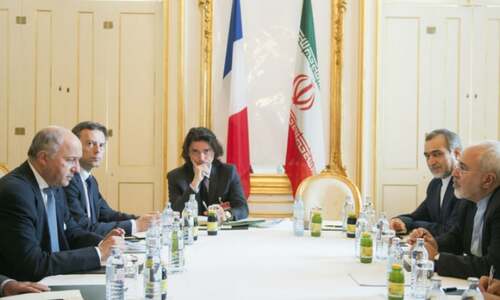WASHINGTON: The chances of reviving the 2015 Iran nuclear deal are worse after indirect US-Iranian talks in Doha that ended without progress, a senior US official said on Thursday.
“You could describe Doha at best as treading water, at worst as moving backwards. But at this point treading water is for all practical purposes moving backwards,” said the official on condition of anonymity.
The official would not go into the details of the Doha talks, during which European Union officials shuttled between the two sides trying to revive the 2015 Joint Comprehensive Plan of Action (JCPOA) agreement under which Iran had limited its nuclear programme in return for relief from economic sanctions.
Then US president Donald Trump reneged on the agreement in 2018 and restored harsh US sanctions on Iran, prompting Tehran to start violating its nuclear restrictions about a year later.
“Their vague demands, reopening of settled issues, and requests clearly unrelated to the JCPOA all suggests to us ... that the real discussion that has to take place is (not) between Iran and the US to resolve remaining differences. It is between Iran and Iran to resolve the fundamental question about whether they are interested in a mutual return to the JCPOA,” the senior US official said.
“At this point, we are not sure if they (the Iranians) know what more they want. They didn’t come to Doha with many specifics,” he added.
Speaking at the UN Security Council, US, British and French diplomats all placed the onus on Iran for the failure to revive the agreement after more than a year of negotiations.
Iran, however, characterised the Doha talks as positive and blamed the US for failing to provide guarantees that a new US administration would not again abandon the deal as Trump had done.
“Iran has demanded verifiable and objective guarantees from the US that JCPOA will not be torpedoed again, that the US will not violate its obligations again, and that sanctions will not be re-imposed under other pretexts or designations,” Iran’s UN Ambassador Majid Takht Ravanchi told the council.
Published in Dawn, July 2nd, 2022















































